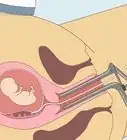This article was co-authored by Wendy Powell. Wendy Powell is a Maternal Health and Exercise Specialist and the Founder and CEO of MUTU System, the world's best-selling, medically recommended online fitness education program for mothers. Wendy specializes in pregnancy, post-baby recovery, postpartum exercises, fitness education, and body confidence. Wendy works to shift the conversation on women's bodies towards equality and empowerment for health, confidence, and power. She is a published author, international speaker, and award-winning entrepreneur. Wendy is on the Women's Development Board of the MicroLoan Foundation and is a frequent contributor to the BBC. MUTU System has been featured in Vogue, the Huffington Post, Fox News Health, Daily Mail, and The Guardian, and is recommended by Hollywood Trainer, Jeanette Jenkins.
There are 15 references cited in this article, which can be found at the bottom of the page.
This article has been viewed 19,536 times.
Sleeping during pregnancy in your first trimester can feel impossible. You need to get up to go to the bathroom every five minutes, and you have heartburn. You may be worried about the new life you're bringing to the world, causing your mind to race and giving you insomnia. You're definitely not alone! While you're not likely to get perfect sleep while pregnant, it's totally possible to sleep better during pregnancy and avoid sleep problems by adjusting your routine and environment. Check out the tips below to learn how to sleep better while pregnant during your first trimester.
Steps
Getting to Sleep on Time
-
1Schedule your sleep and set a reminder. If you have a hard time remembering to go to bed on time, try setting an alarm an hour before you need to be in bed. That way, you can start shutting off your electronics and winding down for bed.[1]
- Making enough time for sleep is one of the most important things you can do to ensure you get enough sleep.
-
2Develop a bedtime routine. Picking a relaxing activity before bed will help your body and mind settle down for sleep. Try drinking warm milk or herbal tea, for instance, or having a warm bath.[2]
- You could also listen to relaxing music or try meditation.
- Making love can also be relaxing before bedtime if you feel like it.[3]
Advertisement -
3Write down thoughts that are running through your head. If you're having trouble sleeping because your mind is racing, take a moment to make a list of the things you're thinking about. That way, you can put the thoughts aside and go to sleep.[4]
- For instance, make a to-do list, such as "Go to grocery store, pick up dry cleaning, call sister."
- If it's emotions that are keeping you up, try writing in a journal before you sleep. Jot down what you're feeling, and try to come up with ideas that will make you feel better. For instance, if you're worried about becoming a parent, try taking a parenting class.
-
4Skip caffeine altogether after 12 p.m. You shouldn't be on much caffeine while pregnant, anyway, but it's best to avoid it altogether later in the day. The caffeine can keep you up at night, making it harder to get the rest you need.[5]
- Keep in mind that even chocolate has some caffeine!
-
5Add a nightlight to your bathroom so you don't need to turn the light on. Light signals to your brain that it's time to get up. If you turn the overhead light on when you visit the bathroom, you will wake up more. The softer nightlight will help keep you in your drowsy state.[6]
- Pick a nightlight that's just bright enough to see by.
- Resist the urge to pick up your phone while going to the bathroom. That will only wake you up more![7]
Making Yourself Comfortable
-
1Sleep on your left side to keep pressure off your liver. Your liver is on the right side of your body, so when you sleep on the right side, it can put pressure on that organ, particularly during pregnancy. Plus, sleeping on your left side helps with circulation.[8]
- Better circulation means more blood flow for your baby, too.
- Avoid sleeping on your belly if your breasts are sore. During the first trimester, your breasts may be sore and tender, and therefore, you may find it painful to sleep on your stomach.[9]
-
2Add pillows to make yourself more comfortable. If you're having trouble sleeping on your side, pillows may help. Place a pillow between your knees, for instance, or an extra pillow under your head.[10] You could even use a u-shaped pregnancy pillow that goes around your whole body.[11]
- You could also use a pillow to support your back or your stomach. Do whatever it takes to get comfortable.
-
3Wear a sports bra or maternity bra at night to reduce breast pain. Providing support for your tender breasts can lessen the pain. Pick a soft, comfortable bra that fits well to wear to bed.[12]
- Try different bras to see what works best for you. You may even find that wearing no bra feels the best.
- If your breast pain is still keeping you up, talk to your doctor about taking acetaminophen at night.
-
4Combat heartburn by propping your head up. Gravity helps keep acid in your stomach, so propping your head up can reduce your heartburn. Put an extra pillow under your head, for instance.[13]
- You can also prop up the top of the bed by placing a wedge pillow under the mattress.
Taking Care of Medical Issues
-
1Slow down on liquids in the evening to avoid nighttime bathroom trips. While you need to stay hydrated during your pregnancy, you are also going to be urinating more frequently, which can disrupt your sleep.[14] To help with this issue, drink less in the evening than you do throughout the day.[15]
- Make sure to get in at least 8 glasses of water earlier in the day.
-
2Eat a small snack before bedtime to help with nausea. Aim to eat small meals throughout the day, then opt for something high in fat or protein at bedtime. For instance, try cheese, eggs, or part of an avocado right before bed.[16]
- Avoid sugary foods in the evening altogether, as they'll give you an energy boost when you're trying to fall asleep, the opposite of what you want![17]
- When you first get up, eat a few crackers to combat nausea early in the day.
-
3Chow down on an early dinner to help prevent heartburn. If you keep having heartburn at night, make sure you're eating dinner early, even if it's a small one. Then, have your snack before bed. That way, you won't be hungry, but you won't be so full that you'll have heartburn.[18]
- Also, pay attention to what foods cause heartburn for you and try to avoid them.
- You can also take calcium carbonate tablets to help combat your heartburn.
-
4Use nasal strips or saline sprays to combat congestion. Higher levels of the hormone progesterone in your body can lead to a stuffy nose. Try nasal strips while you're sleeping to help you breathe better or spritz the inside of your nose with a saline spray right before you sleep.[19]
- Avoid decongestants and steroid sprays in your first trimester unless your doctor okays it.
-
5Take naps to make up for the sleep you're missing at night. If you're having trouble sleeping at night, you may be able to make up for it with short naps during the day. For instance, you could get a quick nap in your car at lunch, and then eat while you work.[20]
- While you should nap when you need to, try to do it earlier in the day. That way, you won't affect your sleep at night as much. If you nap too close to bedtime, you may have trouble falling asleep.[21]
Expert Q&A
-
QuestionIs it OK to sleep a lot in the first trimester?
 Wendy PowellWendy Powell is a Maternal Health and Exercise Specialist and the Founder and CEO of MUTU System, the world's best-selling, medically recommended online fitness education program for mothers. Wendy specializes in pregnancy, post-baby recovery, postpartum exercises, fitness education, and body confidence. Wendy works to shift the conversation on women's bodies towards equality and empowerment for health, confidence, and power. She is a published author, international speaker, and award-winning entrepreneur. Wendy is on the Women's Development Board of the MicroLoan Foundation and is a frequent contributor to the BBC. MUTU System has been featured in Vogue, the Huffington Post, Fox News Health, Daily Mail, and The Guardian, and is recommended by Hollywood Trainer, Jeanette Jenkins.
Wendy PowellWendy Powell is a Maternal Health and Exercise Specialist and the Founder and CEO of MUTU System, the world's best-selling, medically recommended online fitness education program for mothers. Wendy specializes in pregnancy, post-baby recovery, postpartum exercises, fitness education, and body confidence. Wendy works to shift the conversation on women's bodies towards equality and empowerment for health, confidence, and power. She is a published author, international speaker, and award-winning entrepreneur. Wendy is on the Women's Development Board of the MicroLoan Foundation and is a frequent contributor to the BBC. MUTU System has been featured in Vogue, the Huffington Post, Fox News Health, Daily Mail, and The Guardian, and is recommended by Hollywood Trainer, Jeanette Jenkins.
Maternal Health & Exercise Specialist Definitely. The early weeks of the first trimester can be pretty rough on you, and it's reasonable to be more tired than you normally are. Don't beat yourself up over this one; if you need to rest, take a rest.
Definitely. The early weeks of the first trimester can be pretty rough on you, and it's reasonable to be more tired than you normally are. Don't beat yourself up over this one; if you need to rest, take a rest. -
QuestionIs it better to sleep on your back or your side?
 Wendy PowellWendy Powell is a Maternal Health and Exercise Specialist and the Founder and CEO of MUTU System, the world's best-selling, medically recommended online fitness education program for mothers. Wendy specializes in pregnancy, post-baby recovery, postpartum exercises, fitness education, and body confidence. Wendy works to shift the conversation on women's bodies towards equality and empowerment for health, confidence, and power. She is a published author, international speaker, and award-winning entrepreneur. Wendy is on the Women's Development Board of the MicroLoan Foundation and is a frequent contributor to the BBC. MUTU System has been featured in Vogue, the Huffington Post, Fox News Health, Daily Mail, and The Guardian, and is recommended by Hollywood Trainer, Jeanette Jenkins.
Wendy PowellWendy Powell is a Maternal Health and Exercise Specialist and the Founder and CEO of MUTU System, the world's best-selling, medically recommended online fitness education program for mothers. Wendy specializes in pregnancy, post-baby recovery, postpartum exercises, fitness education, and body confidence. Wendy works to shift the conversation on women's bodies towards equality and empowerment for health, confidence, and power. She is a published author, international speaker, and award-winning entrepreneur. Wendy is on the Women's Development Board of the MicroLoan Foundation and is a frequent contributor to the BBC. MUTU System has been featured in Vogue, the Huffington Post, Fox News Health, Daily Mail, and The Guardian, and is recommended by Hollywood Trainer, Jeanette Jenkins.
Maternal Health & Exercise Specialist Early on in the first trimester you should sleep in whatever way makes you the most comfortable. Later on in your pregnancy, you'll want to sleep on your side. As your child grows, the added weight can make it difficult to lie your back comfortably. Stuff a pillow in between your legs and lie on your side to stay comfortable.
Early on in the first trimester you should sleep in whatever way makes you the most comfortable. Later on in your pregnancy, you'll want to sleep on your side. As your child grows, the added weight can make it difficult to lie your back comfortably. Stuff a pillow in between your legs and lie on your side to stay comfortable. -
QuestionWhy am I waking up to use the bathroom so often?
 Wendy PowellWendy Powell is a Maternal Health and Exercise Specialist and the Founder and CEO of MUTU System, the world's best-selling, medically recommended online fitness education program for mothers. Wendy specializes in pregnancy, post-baby recovery, postpartum exercises, fitness education, and body confidence. Wendy works to shift the conversation on women's bodies towards equality and empowerment for health, confidence, and power. She is a published author, international speaker, and award-winning entrepreneur. Wendy is on the Women's Development Board of the MicroLoan Foundation and is a frequent contributor to the BBC. MUTU System has been featured in Vogue, the Huffington Post, Fox News Health, Daily Mail, and The Guardian, and is recommended by Hollywood Trainer, Jeanette Jenkins.
Wendy PowellWendy Powell is a Maternal Health and Exercise Specialist and the Founder and CEO of MUTU System, the world's best-selling, medically recommended online fitness education program for mothers. Wendy specializes in pregnancy, post-baby recovery, postpartum exercises, fitness education, and body confidence. Wendy works to shift the conversation on women's bodies towards equality and empowerment for health, confidence, and power. She is a published author, international speaker, and award-winning entrepreneur. Wendy is on the Women's Development Board of the MicroLoan Foundation and is a frequent contributor to the BBC. MUTU System has been featured in Vogue, the Huffington Post, Fox News Health, Daily Mail, and The Guardian, and is recommended by Hollywood Trainer, Jeanette Jenkins.
Maternal Health & Exercise Specialist As your pregnancy progresses, there's going to be a lot more pressure on your pelvic organs. Over time, there will be more and more pressure being applied to your bladder specifically, which can make it feel like you need to urinate more often than you normally would. This is pretty normal and while it's certainly annoying, it's not anything to worry about.
As your pregnancy progresses, there's going to be a lot more pressure on your pelvic organs. Over time, there will be more and more pressure being applied to your bladder specifically, which can make it feel like you need to urinate more often than you normally would. This is pretty normal and while it's certainly annoying, it's not anything to worry about.
References
- ↑ https://www.sleepfoundation.org/sleep-news/sleeping-the-trimesters-1st-trimester
- ↑ https://www.parenting.com/pregnancy/5-first-trimester-sleep-solutions
- ↑ https://www.whattoexpect.com/pregnancy/sleep-solutions/pregnancy-sleep-problems-solutions/
- ↑ https://www.parenting.com/pregnancy/5-first-trimester-sleep-solutions
- ↑ https://www.whattoexpect.com/pregnancy/sleep-solutions/pregnancy-sleep-problems-solutions/
- ↑ https://www.sleepfoundation.org/sleep-news/sleeping-the-trimesters-1st-trimester/page/0/2
- ↑ https://www.parenting.com/pregnancy/5-first-trimester-sleep-solutions
- ↑ https://kidshealth.org/en/parents/sleep-during-pregnancy.html
- ↑ https://www.sleep.org/articles/sleep-during-first-trimester/
- ↑ Wendy Powell. Maternal Health & Exercise Specialist. Expert Interview. 24 September 2020.
- ↑ https://www.whattoexpect.com/pregnancy/sleep-solutions/pregnancy-sleep-problems-solutions/
- ↑ https://www.parenting.com/pregnancy/5-first-trimester-sleep-solutions
- ↑ https://www.parenting.com/pregnancy/5-first-trimester-sleep-solutions
- ↑ Wendy Powell. Maternal Health & Exercise Specialist. Expert Interview. 24 September 2020.
- ↑ https://www.sleepfoundation.org/sleep-news/sleeping-the-trimesters-1st-trimester/page/0/2
- ↑ https://www.parenting.com/pregnancy/5-first-trimester-sleep-solutions
- ↑ https://www.whattoexpect.com/pregnancy/sleep-solutions/pregnancy-sleep-problems-solutions/
- ↑ https://www.parenting.com/pregnancy/5-first-trimester-sleep-solutions
- ↑ https://www.whattoexpect.com/pregnancy/sleep-solutions/pregnancy-sleep-problems-solutions/
- ↑ https://www.sleep.org/articles/sleep-during-first-trimester/
- ↑ https://www.sleep.org/articles/sleep-during-first-trimester/











































































Medical Disclaimer
The content of this article is not intended to be a substitute for professional medical advice, examination, diagnosis, or treatment. You should always contact your doctor or other qualified healthcare professional before starting, changing, or stopping any kind of health treatment.
Read More...